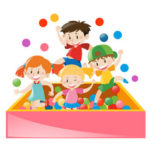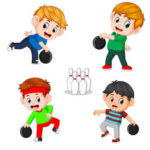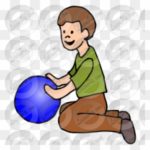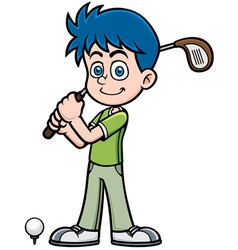
by Neetu | Jun 2, 2020 | Fitness Activity
Movement skills/concepts
Striking with a long implement (golf club) in different directions, at different speeds and towards a stationary target, relationships (with objects) and body awareness.
Set-up
Golf clubs, a variety of small light (foam or plastic) balls, hoops, a variety of objects for targets (targets suitable for wall include masking tape, chalk marks, and suspended hoops; possibilities for the ground include bins, seats/chairs/trees, playground equipment, and markings).
Children are spread out in a hard or grass area with a wall. If inside, have mats on the ground to protect the floor.
Activity
Children have a club each and a variety (about five) of small lightweight balls. They practice the following tasks:
- swing the club back and forth like a pendulum, scuffing the grass/mat – check there is no one behind you or in front of you
- stand approximately four giant steps away from a hoop, stand beside your ball and swing your club (pendulum motion) to see how many balls you can get into a hoop
- find a space approximately four giant steps away from a wall or fence, stand beside the wall/fence and strike the ball so that it travels to the wall/fence; if it comes back to you, stop it before you hit it again
- strike the ball to the wall, so that it goes along the ground, and then try to hit it in the air
- see how many times you can hit the range of targets on the wall, fence or ground
Variations
Vary skill and equipment: Strike the ball with feet/hand(s), softball/cricket bats or hockey sticks.

by Neetu | Jun 2, 2020 | Fitness Activity
Movement skills/concepts
Striking a stationary ball at a stationary target.
Set-up
Batting tees (cricket or softball), bats or sticks, small balls, hoops.
In each group of four, a batter stands at the tee and the others are fielders in hoops spread in front of the tee in a large grass area.
Activity
As the batter hits the ball off the tee, they name the fielder they are hitting to. That fielder must keep one foot in the hoop and attempt to field the ball.
The batter scores a point if the fielder is successful. The batter has three turns, then changes roles with a field
- gripping with hands together
- backswing, hands level with the shoulder (softball bat)
- step and swing
- following through
Variations
Toss ball: Skilled players can hit a moving ball, (e.g. toss the ball up and hit, or hit a slow-pitched ball or bowl).
Vary equipment and skill: Use a golf club or hockey stick.

by Neetu | Jun 2, 2020 | Fitness Activity
Movement skills/concepts
Striking a stationary ball off a tee, relationships (with others), time, and energy.
Set-up
Softball bat or bat shapes, small balls, batting tees, markers. Batting tees are spread out along a line in a defined grass area. A group of 4 children is at each tee, with a bat and three balls.
Activity
One person in the group is the batter; the other three are the fielders. In turn, the batter hits the three balls:
- in the direction of the fielders
- indifferent directions
- for distance
- between two markers
- along the ground
- to the same place
Variations
Extend skills: As skill level improves, try the same activities with the ball lobbed for the batter to hit on the full.
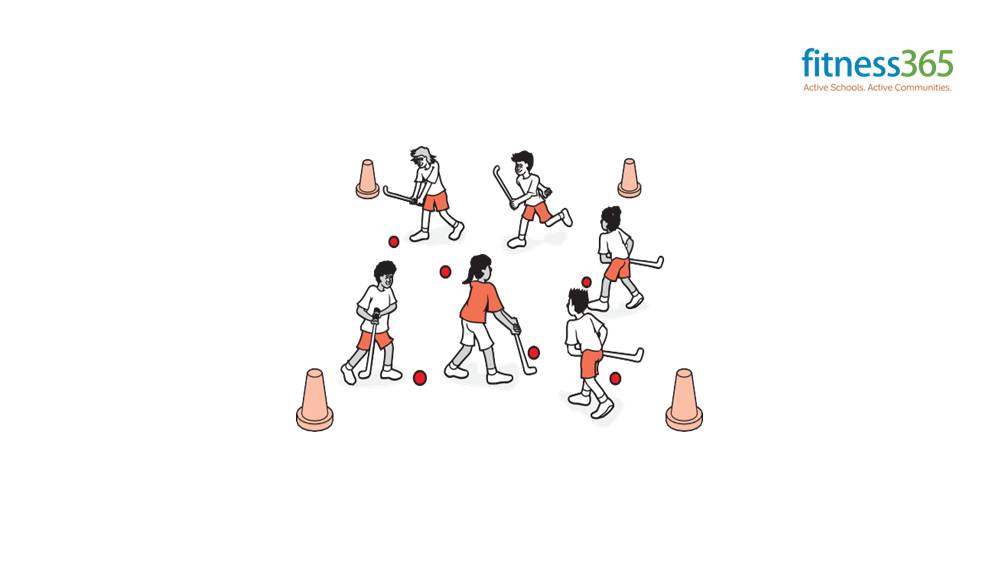
by Neetu | Jun 2, 2020 | Fitness Activity
Movement skills/concepts
Controlling a ball with a hockey stick, pushing and hitting a stationary ball, space awareness, body awareness, time and energy, and relationships (with others).
Set-up
- Small balls, (e.g. soft/tennis balls), hockey sticks, markers/cones.
- Children are spread out in a defined level grass or hard area, each with a stick and ball.
Activity
- push the ball a short distance, follow and stop it
- push the ball to space, stop it, then push it to another space in a different direction
- push the ball as softly/firmly/quickly as you can
- push the ball in different pathways (forwards, backward, in a straight line, in a circle)
- push the ball with jerky/smooth movements
- hit the ball with everyone else, when all are facing the same way
In pairs with a stick each and one ball, can you …?
- push the ball gently to each other
- move back, approximately 5 meters apart, and see how many pushes you can do in 30 seconds
- hit the ball to each other
- put a marker between you and push/hit the ball at the marker
- push/hit the ball to your partner, then move to a new place to receive the return
Hitting
- hands together with left hand on top
- eyes on the ball and easy swing
- left shoulder pointing in direction of the ball
- hitting the bottom half of ball and follow-through
Variations
Vary equipment: Use different implements, (e.g. golf club or cricket bat).
Accuracy: Include a variety of stationary targets for the children to aim for by either pushing or hitting the ball.
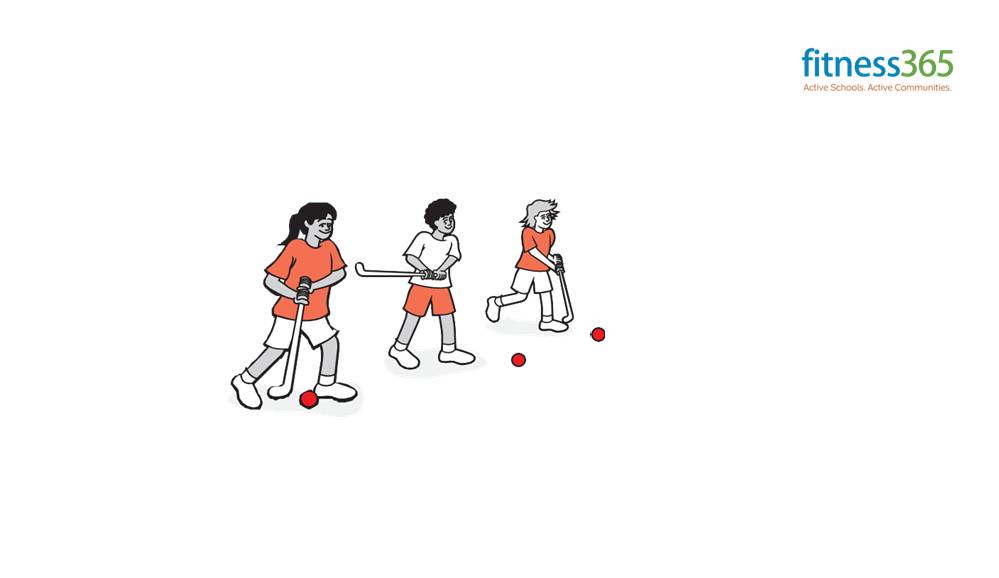
by Neetu | Jun 2, 2020 | Fitness Activity
Movement skills/concepts
Controlling a small ball with a long implement (hockey stick), space awareness (pathways and direction), and different speeds.
Set-up
- Hockey sticks, small balls, markers.
- Children are freely spaced in a defined grass or hard area, each with a hockey stick and ball.
Activity
- move the ball with your stick and keep it close to you while standing still/ walking/jogging
- stop the ball and then continue
- change direction
- dribble along a line
- change speed without stopping
- dribble in circles, squares, zigzags, etc
- stop and turn in different ways
Variations
Dribbling pathways: Set out cones in different shapes, (e.g. triangle, circle, zigzag), dribble in a given direction, forward, reverse, in, and out of the cones.
Vary speed: On a signal, change speed.
Vary equipment: Carry out above activities with hand/foot dribbling.
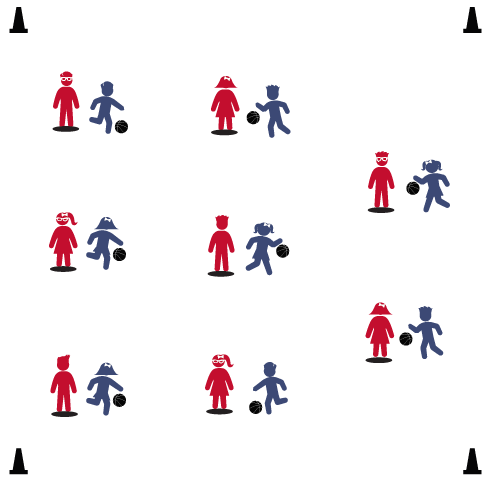
by Santosh | Jun 2, 2020 | Fitness Activity
LEARNING OUTCOMES
Dribbles in self-space with a preferred hand demonstrating a mature pattern
STUDENT TARGETS
Skill: I will dribble the ball with 1 hand while walking in general space.
Cognitive: I will be able to show the teacher which hand I prefer to use when I dribble.
Fitness: I will actively participate in today’s activity to improve and help my partner improve dribbling skills.
Personal & Social Responsibility: I will share the equipment and space with my partner.
TEACHING CUES
- Dribble with Finger Pads, Waist High
- Eyes Alert, Make Quick Looks
ACTIVITY SET-UP & PROCEDURE
EQUIPMENT:
- 4 large cones
- 1 basketball per 2 students
- 1 poly spot per 2 students
SET-UP:
- Create boundaries for a large activity area with cones.
- Scatter poly spots throughout the area.
- Pair students, scattered throughout the area.
- One student on a spot and the other with a ball.

ACTIVITY PROCEDURES:
- You have done a great job practicing and improving your dribbling skills. Now it is time for a Driver’s Test!
- The partner with the ball is the driver. The partner on the spot is the driving instructor. When I say, “GO!” the drivers are going to dribble throughout the activity area, working hard not to cause a crash.
- Driving instructors will watch their drivers. On the stop signal, give the driver thumbs upgrade if the driver follows the cues we have learned in class. (See grade level progressions for specific criterion.)
- After all, drivers have received their grades, switch roles, and begin on the start signal.
COOL DOWN/ CLOSURE
Review Skill/Activity, stretching, and questions.









